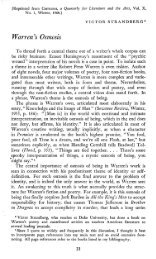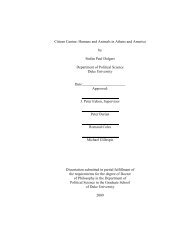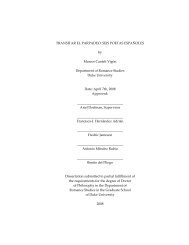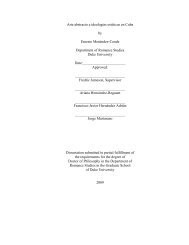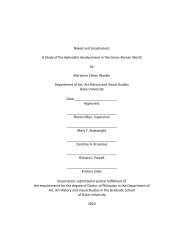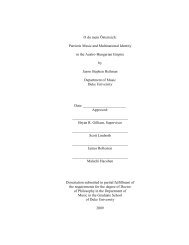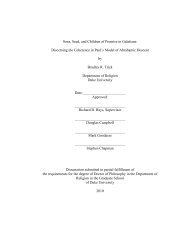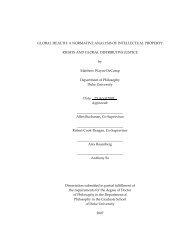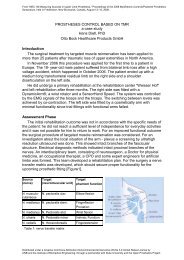View/Open - DukeSpace - Duke University
View/Open - DukeSpace - Duke University
View/Open - DukeSpace - Duke University
Create successful ePaper yourself
Turn your PDF publications into a flip-book with our unique Google optimized e-Paper software.
heterosexual life (embodied by the new wife). Beijing Comrade caricatures the trope of marriage<br />
to co-opt the conventional gender norms of heterosexuality. Instead of its original meaning<br />
signifying a naturalized relation, the normative convention of heterosexual marriage is deployed<br />
to symbolize the alternate homosexual relation that was denied. Heterosexual marriage, then,<br />
serves as an early point of departure for the text of “Beijing Story” to introduce and focus on<br />
homosexual relations vis-à-vis the homo/hetero binary. This demarcation between the homo- and<br />
heterosexual worlds – between the private and public spheres – is an evocative theme throughout<br />
the novella. This tension is evident when characters act in ways that are attributed to specific<br />
genders, contesting the prevalent homo/heterosexual dichotomy by illustrating shared aspects in<br />
both sexual domains. In this way, the text reinscribes homosexuality within the heterosexual<br />
paradigm, deconstructing gender conventions of opposite-sex relationships and creating a space<br />
for homosexuality to emerge.<br />
The storyline of “Beijing Story” draws parallels in the depiction of Han Dong’s sexual<br />
encounters to the traditional Chinese sexual world where sexual acts of men were defined by<br />
social roles of penetrator/penetrated and superior/inferior, regardless of the sex or gender of his<br />
partner (Chou 2001). Han Dong’s sexual promiscuity with multiple male and female sex partners<br />
can thus be construed as an enactment of his elite position in the social and sexual hierarchy due<br />
to his superior wealth, age, and employment. Han Dong takes care of all of his partners in a<br />
material manner by giving them money and buying gifts, taking on the traditional role of an<br />
active male provider and penetrator to dominate social and sexual intercourse. At one point early<br />
in the story, Han Dong ponders how same-sex relations give him “a strong desire to conquer …<br />
to dominate a man like eating a piece of cake” where “a woman is nothing” in comparison (5).<br />
This statement affirms Han Dong’s position as a dominant male and explains his homosexual<br />
Chapter One | 34



